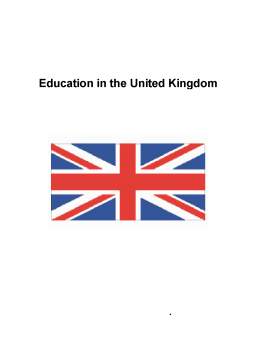Extras din proiect
Historical Importance of Education
Education is a vital concern throughout Britain because a highly developed nation depends upon educated professionals and a skilled workforce. The literacy rate in Britain is one of the highest in the world at over 99 percent.
Britain’s first education act, in 1870, was inspired by the pioneering example of mass compulsory education in Germany and provided for state-financed primary education. Another major education act, passed in 1902, established local education authorities (LEAs) that were responsible for providing schools and education in their areas. The act also authorized LEAs to use public funds for church-affiliated schools. This policy was severely criticized by people whose children attended state schools because their taxes were used to support church schools. The 1902 act also established scholarships for secondary education. An education act passed in 1944 and administered by the newly created Ministry of Education established free and compulsory secondary education up to age 15; this was increased to age 16 in 1973. An education reform act in 1988 allowed individual schools to control their own affairs and budgets, free from LEAs, and to receive grants directly from the government. It also established a controversial national curriculum, which was simplified in 1994 after complaints about its complexity. Legislation pertaining to education is laden with controversies because of education’s importance in Britain.
Contrasts with American Education
Compared to the United States, fewer people go on to higher education in Britain, and there is more emphasis on segregating pupils at the lower levels on the basis of ability. Most British schools are funded by the central government, with local governments providing supplemental funding. England and Wales have a national curriculum of core courses for students 5 to 16 years old, and schools are inspected by the Office for Standards in Education. National tests at the ages of 7, 11, and 14 assess students’ progress. Schools must provide religious education and daily collective worship for all pupils, although parents can withdraw their children from these. Full-time school begins at age 5 in Great Britain and at age 4 in Northern Ireland. In addition, about half of 3- and 4-year-olds are enrolled in specialized nursery schools or in nursery classes at primary schools.
In Britain, the term form is used to designate grade; old boys and old girls refer to people who have graduated from a school. Private schools or independent schools are called public schools, a term that means just the opposite in the United States. What are called public schools in the United States is called state schools in Britain. When a person is sent down from school, it means he or she has been thrown out. Grammar schools are university preparatory schools, most of which have been replaced by comprehensive schools catering to students of all academic abilities. Secondary modern schools provide vocational education rather preparation for university entrance.
Types of Schools in Britain
The most famous schools in Britain are private boarding schools, such as Eton College, Harrow School, Rugby School, and Winchester School. These famous private schools, founded during the Middle Ages, are theoretically open to the public, but in reality are attended by those who can afford the fees. Many of Britain’s leaders have attended these private schools, which cater to the wealthy and influential but also offer some scholarships to gifted poorer children. Local authorities and the central authority also provide assistance to some families who are unable to pay the fees. Only a small percentage of the population can attend these ancient and highly prestigious schools. A variety of other schools are also private, including kindergartens, day schools, and newer boarding schools. Private schools that take pupils from the age of 7 to the age of 11, 12, or 13 are called preparatory schools. Private schools that take older pupils from the age of 11, 12, or 13 to 18 or 19 are often referred to as public schools. Only 7 percent of British students attend private school.
In England, Wales, and Northern Ireland, the education systems are similar. The majority of the students attend schools wholly or partly supported with public funds. These include state schools owned and funded by LEAs; voluntary schools established and funded mostly by religious denominations; self-governing or grant-maintained (GM) schools that receive funds directly from the government rather than local authorities; and specialist schools that are connected to a private backer. Most pupils attend LEA schools. About 15 percent of secondary schools are GM schools.
In Scotland, educational authorities are largely independent of those in the rest of the United Kingdom, although reforms, such as rising the age at which students may leave school, are similar. Nearly all-Scottish schools are comprehensive, meaning they serve students of all abilities, and school boards involve parents and professionals. Recent reforms introduced local management of schools and allow state schools to become self-governing if voters approve the change in an election. The school then receives funds directly from the central government instead of from the local authority.
In 1997 Scotland elected to form its own legislature, separate from the Parliament in London. As a result, education in Scotland may change significantly due to Scotland’s 1999 parliamentary elections. Through its parliament, Scotland can address its own educational issues and create its own educational authorities. These authorities have the responsibilities once handled by the secretary of state for Scotland and other non-Scottish educational organizations. Wales also elected its own governing body, the Welsh Assembly, with the power to make similar decisions regarding the Welsh education system.
In Northern Ireland the schools are segregated by religious affiliation. Local education authorities provide for schools, but nearly all-secondary students in Northern Ireland attend voluntary schools—church schools maintained by either the Catholic or the Protestant church. In an attempt to break down religious segregation and provide integrated education, the state established a number of integrated schools; about 2 percent of the school population attends these schools.
Preview document
Conținut arhivă zip
- Education in The UK.doc































